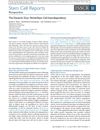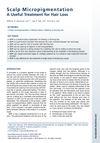 1 citations,
June 2023 in “Ethnobotany research and applications”
1 citations,
June 2023 in “Ethnobotany research and applications” The review concludes that the Ziziphus species, especially jujube, may promote hair growth and have various health benefits, warranting more research.

Female hair loss is often hereditary and can be treated with medication, hair transplants, and lasers.
 February 2024 in “Recima21”
February 2024 in “Recima21” Covid-19 can cause hair loss due to immune and psychological factors.
 June 1994 in “The American Journal of Cosmetic Surgery”
June 1994 in “The American Journal of Cosmetic Surgery” The article emphasizes the need for proper training and ethical practice in hair transplantation to prevent poor outcomes and psychological harm to patients.
 July 2019 in “Dermatología Cosmética, Médica y Quirúrgica”
July 2019 in “Dermatología Cosmética, Médica y Quirúrgica” Small injections of dutasteride improved hair thickness in men with hair loss without major side effects.
 359 citations,
January 2015 in “Cold Spring Harbor Perspectives in Medicine”
359 citations,
January 2015 in “Cold Spring Harbor Perspectives in Medicine” Hair growth phase and certain genes can speed up wound healing, while an inflammatory mediator can slow down new hair growth after a wound. Understanding these factors can improve tissue regeneration during wound healing.
 275 citations,
March 1999 in “Journal of The American Academy of Dermatology”
275 citations,
March 1999 in “Journal of The American Academy of Dermatology” Chemotherapy can cause various skin reactions, with hair loss being the most common, and proper diagnosis and treatment of these reactions are important.
 88 citations,
January 2013 in “Indian Journal of Dermatology, Venereology and Leprology”
88 citations,
January 2013 in “Indian Journal of Dermatology, Venereology and Leprology” Minoxidil and finasteride effectively treat hair loss.
 55 citations,
July 2016 in “Dermatologic Therapy”
55 citations,
July 2016 in “Dermatologic Therapy” Multiple treatments work best for hair loss.
 41 citations,
September 2014 in “JAMA Facial Plastic Surgery”
41 citations,
September 2014 in “JAMA Facial Plastic Surgery” Use finasteride, minoxidil, and follicular unit transplantation for hair loss treatment.
 31 citations,
May 2015 in “Stem Cell Reports”
31 citations,
May 2015 in “Stem Cell Reports” Stem cells and their surrounding environment in hair follicles work closely together, affecting hair growth and having implications for cancer and tissue regeneration.
 24 citations,
August 2013 in “Facial Plastic Surgery Clinics of North America”
24 citations,
August 2013 in “Facial Plastic Surgery Clinics of North America” SMP is a medical tattoo for hair loss, improving appearance and camouflaging scars, but requires skill and has limitations.
 21 citations,
November 2012 in “Plastic and Reconstructive Surgery”
21 citations,
November 2012 in “Plastic and Reconstructive Surgery” Both genetic and lifestyle factors significantly affect female hair loss.
 15 citations,
October 2014 in “Hormone Molecular Biology and Clinical Investigation”
15 citations,
October 2014 in “Hormone Molecular Biology and Clinical Investigation” Some hair loss and prostate drugs might increase the risk of diabetes and heart disease.
 10 citations,
September 2013 in “Veterinary dermatology”
10 citations,
September 2013 in “Veterinary dermatology” Medroxyprogesterone injections caused hair regrowth in some dogs with alopecia X.
 9 citations,
June 2020 in “Actas Dermo-Sifiliográficas”
9 citations,
June 2020 in “Actas Dermo-Sifiliográficas” Spironolactone is effective for acne, hidradenitis suppurativa, female hair loss, and hirsutism but is underused in dermatology.
 3 citations,
January 2010 in “Actas Dermo-Sifiliográficas”
3 citations,
January 2010 in “Actas Dermo-Sifiliográficas” Immunization and throat bacteria may increase the risk of a hair loss condition called alopecia areata.
 3 citations,
November 2014 in “Protein Expression and Purification”
3 citations,
November 2014 in “Protein Expression and Purification” Scientists successfully purified a protein called Wnt3a, which is involved in processes like hair growth, but the overall yield was low, suggesting more work is needed to improve this.
 2 citations,
March 2021 in “bioRxiv (Cold Spring Harbor Laboratory)”
2 citations,
March 2021 in “bioRxiv (Cold Spring Harbor Laboratory)” Hairless mammals have genetic changes in both their protein-coding and regulatory sequences related to hair.
 1 citations,
June 2012 in “Actas Dermo-Sifiliográficas”
1 citations,
June 2012 in “Actas Dermo-Sifiliográficas” Early and aggressive treatment of scarring alopecia is important to prevent further hair follicle damage.
 January 2016 in “Georg Thieme Verlag eBooks”
January 2016 in “Georg Thieme Verlag eBooks” The document recommends personalized, culturally sensitive treatments to rejuvenate the aging Asian face, focusing on natural results and specific techniques for skin, hair, and facial features.
 March 2014 in “Journal of The American Academy of Dermatology”
March 2014 in “Journal of The American Academy of Dermatology” Vitamin D deficiency is common in temporary hair loss, and stress is often a suspected cause.
 February 2014 in “Medicine - Programa De Formación Médica Continuada Acreditado”
February 2014 in “Medicine - Programa De Formación Médica Continuada Acreditado” The document concludes that non-scarring alopecias can be reversed, but scarring alopecias cause permanent hair loss.
 October 1997 in “Baylor University Medical Center Proceedings”
October 1997 in “Baylor University Medical Center Proceedings” Obesity in the U.S. is largely influenced by diet and exercise, certain medications can improve heart procedures and hair growth, and major teaching hospitals have better patient outcomes.
 August 2020 in “Actas Dermo-Sifiliográficas”
August 2020 in “Actas Dermo-Sifiliográficas” PRP injections improve hair density in men with hair loss, with few short-term side effects.
 788 citations,
February 2007 in “Nature”
788 citations,
February 2007 in “Nature” The document concludes that skin stem cells are important for hair growth and wound healing, and could be used in regenerative medicine.
 343 citations,
December 2008 in “Endocrine Reviews”
343 citations,
December 2008 in “Endocrine Reviews” Metformin helps with menstrual cycles and insulin levels in PCOS but is less effective for hair growth, diabetes prevention, and weight loss, and may improve fertility and reduce diabetes risk.
 305 citations,
February 2007 in “Hormone and metabolic research”
305 citations,
February 2007 in “Hormone and metabolic research” Human skin makes sexual hormones that affect hair growth, skin health, and healing; too much can cause acne and hair loss, while treatments can manage these conditions.
 100 citations,
April 2010 in “Expert Opinion on Pharmacotherapy”
100 citations,
April 2010 in “Expert Opinion on Pharmacotherapy” Hair loss in men treated best with early medication or transplant, new treatments researched.
 65 citations,
January 2018 in “Nature Reviews Endocrinology”
65 citations,
January 2018 in “Nature Reviews Endocrinology” Skin fat has important roles in hair growth, skin repair, immune defense, and aging, and could be targeted for skin and hair treatments.





























